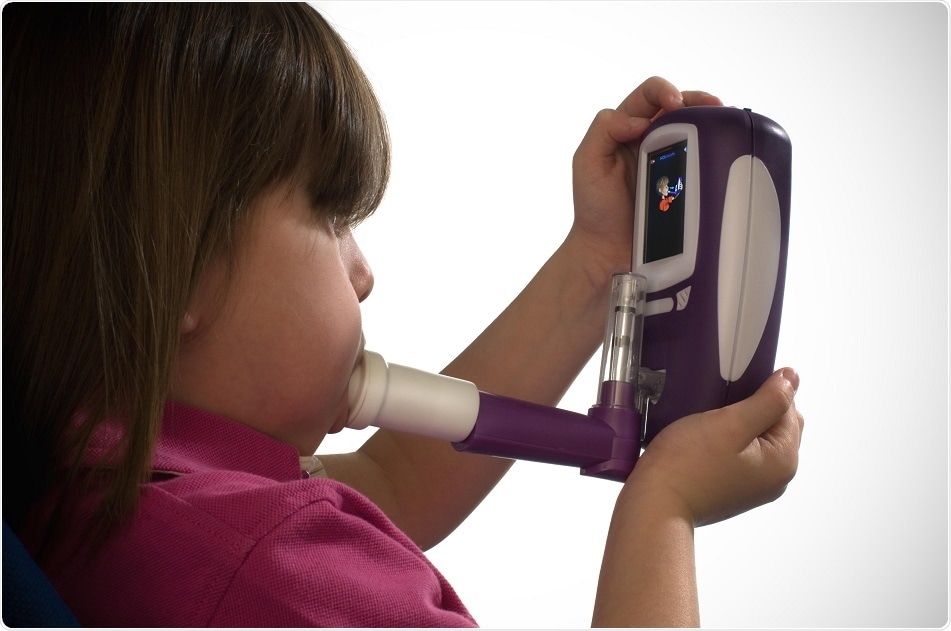According to Asthma UK, currently 5.4 million people suffer from asthma, however, “every day the lives of three families are devastated by the death of a loved one to an asthma attack, and tragically two thirds of these deaths are preventable”.
In 2016 in England and Wales alone, a shocking 1,237 people died from an asthma attack2. On November 29th 2017, NICE published the final guidelines on Asthma: diagnosis, monitoring and chronic asthma management, to improve asthma care, which included the NObreath® FeNO monitor from local manufacturer and second-generation family company, Bedfont Scientific Ltd., as a recommended device.

Image credit: Bedfont Scientific
Bedfont has specialised in the design and manufacture of breath analysis medical devices for over 40 years and in 2017 their NObreath® FeNO monitor is celebrating 10 years of improving asthma management.
Bedfont have been campaigning vigorously to raise awareness of FeNO measuring and its benefits, especially after last year when asthma figures sparked increased concern; statistics released from Asthma UK which found that over 120,000 asthma sufferers in the UK are at risk from wrongly prescribed medication and NICE’s findings that 30% of people with asthma are suspected to have been misdiagnosed3,4.
Asthma UK also found that “around 90,000 people in England, 6,000 in Wales, 7,000 in Scotland and 3,500 in Northern Ireland could have uncontrolled asthma that is not being monitored by health-care professionals.”3
The NICE asthma guidance has been revised in order to resolve the above concerns, and in particular now includes a patient pathway involving the monitoring of FeNO levels at an early stage to help improve basic asthma care, prevent further misdiagnosis of asthma and the wrong prescription of medication. The new guidelines state that FeNO measurements should be considered ‘as an option to support asthma management in people who are symptomatic despite using inhaled corticosteroids’5.
Bedfont has responded to the consultation of the NICE asthma guidance and has been working with GP’s on FeNO testing to raise awareness of the benefits now that the NICE asthma guidance recommends FeNO testing in asthma management.
Bedfont hopes to help improve basic asthma care and save future lives with the NObreath®, which is also conformed to ATS and ERS guidelines6. The NObreath® works by measuring FeNO through breath analysis, making the process quick, simple and non-invasive for both the GP and the patient.
Interpreting FeNO levels aids in identifying patients who do/do not require on-going treatment7 whilst also differentiating between allergic (eosinophilic) and non-allergic asthma8, and if used daily, FeNO measurements can help to predict exacerbations and attacks.9
Using FeNO measurements to evaluate airway inflammation in asthma represents a significant advance in respiratory medicine that had been expensive to deliver in everyday practice, until now with the NObreath®. We are honoured to have worked alongside NICE to help improve basic asthma care. The NICE guidelines are often practised and followed around the world and now the guidance on asthma has been published, we expect countries to follow suit and measure FeNO concentration when assessing potential asthma suffers, helping to save countless lives. We will continue innovating and improving health and hope to have a homecare FeNO device in the future, which will enable asthma patients to monitor their FeNO levels anytime, anywhere, to continue improving asthma management one breath at a time.”
Jason Smith, Managing Director at Bedfont.
REFERENCES
- Measuring fractional exhaled nitric oxide concentration in asthma: NIOX MINO, NIOX VERO and NObreath | Guidance and guidelines | NICE [Internet]. Nice.org.uk. 2014 [cited 11 July 2017]. Available from: https://www.nice.org.uk/guidance/dg12
- Asthma facts and statistics | Asthma UK [Internet]. Asthma UK. 2017 [cited 24 October 2017]. Available from: https://shop.asthmaandlung.org.uk/
- Asthma UK. Patient safety failures in asthma care: the scale of unsafe prescribing in the UK [Internet]. London: Asthma UK; 2015. Available from: https://www.asthma.org.uk/globalassets/campaigns/nrad-one-year-on.pdf
- More than 1m people in UK may have been wrongly diagnosed with asthma [Internet]. the Guardian. 2017 [cited 24 October 2017]. Available from: https://www.theguardian.com/society/2015/jan/28/1m-people-uk-wrongly-diagnosed-asthma
- National Institute for Health and Clinical Excellence (2017) Asthma: diagnosis and monitoring of asthma in adults, children and young people. NICE guideline (NG80)
- ATS/ERS Recommendations for Standardized Procedures for the Online and Offline Measurement of Exhaled Lower Respiratory Nitric Oxide and Nasal Nitric Oxide, 2005; American Journal of Respiratory and Critical Care Medicine; vol. 171: 912-930;2005
- Andrew D. Smith, Jan O. Cowan, Sue Filsell, Chris MacLachlan, Gabrielle Monti-Sheehan, Pamela Jackson and D. Robin Taylor. Diagnosing Asthma: Comparisons between Exhaled Nitric Oxide Measurements and Conventional Tests. Am J Respir Crit Care Med Vol 169. pp 473-478, 2004.
- Coumou HBel E. Improving the diagnosis of eosinophilic asthma [Internet]. Taylor and Francis online. 2017 [cited 15 March 2017]. Available from: http://www.tandfonline.com/doi/full/10.1080/17476348.2017.1236688
- Harkins M. Exhaled Nitric Oxide Predicts Asthma Exacerbation [Internet]. Taylor & Francis. 2017 [cited 21 September 2017]. Available from: http://www.tandfonline.com/doi/abs/10.1081/JAS-120033990